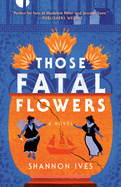
The sirens of Greco-Roman mythology get a colonial American spin in Shannon Ives's Those Fatal Flowers, a shimmering debut replete with sorrow and rage. While serving as handmaiden to the goddess Prosperina, Thelia makes a fateful choice that betrays her beloved goddess to the underworld. As punishment, she and her sisters are cursed to become half-human, half-bird creatures on the island of Scopuli. The sailors they lure to their deaths with songs serve as both sacrificial atonement and spiritual sustenance. Centuries pass before hope appears: a message from Prosperina offering a way to break the curse, so a solitary Thelia sets sail. She eventually washes up on the shores of Roanoke Colony and is taken to the Puritan city of Raleigh, where she poses as a wealthy princess seeking a husband.
Although she is familiar with the ways dangerous men harm women, Thelia is now in a less powerful human form, and she learns new fears and degrees of violation in concert with the colony's women, who are working to survive the unforgiving landscape outside the fort's walls as well as the odious men within. Thelia reckons with the nature of men and monsters while falling in love with Cora, a beautiful settler, and learning that gaining autonomy is never a solitary act. Ives places the sirens' power in their song rather than reducing it to any sort of physical seduction, and she emphasizes the inherent power of what they hold in their mouths. With alluring prose and dual timelines, Those Fatal Flowers crescendos to give readers a tense novel about how underestimating women has been the downfall of many throughout history. --Kristen Coates, editor and freelance reviewer

